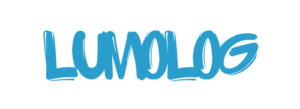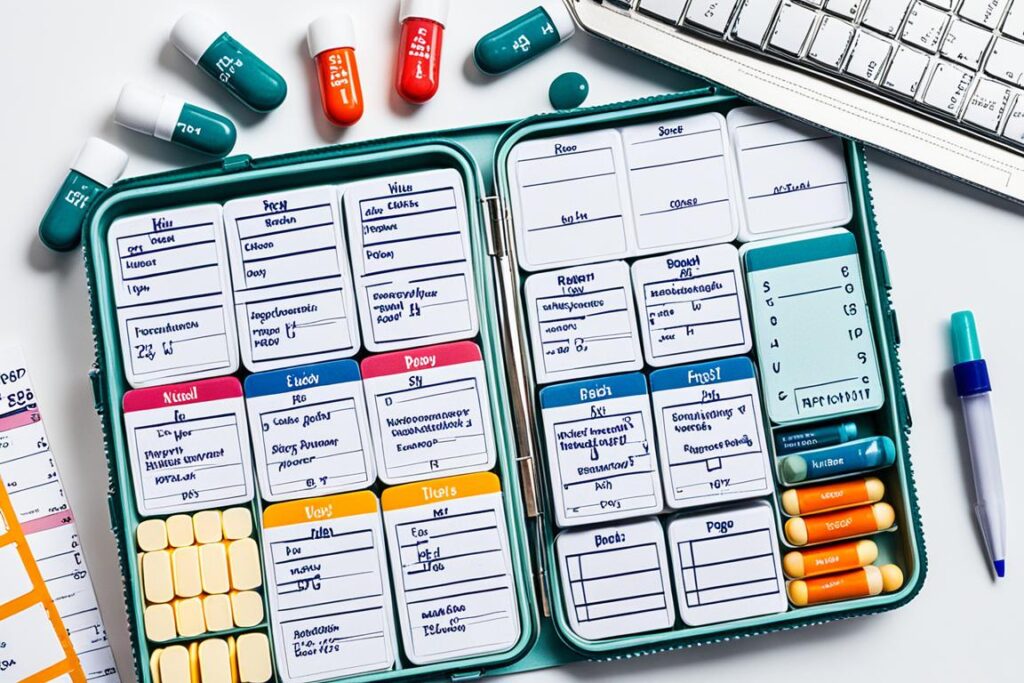Managing medications can be complex, especially when taking multiple prescription drugs for different conditions. According to a study, more than 20% of adults in the US aged 40 and older take five or more prescription drugs. To effectively manage medications, it is important to follow medication schedules and doses, utilize pill organizers, inform all clinicians about the medications being taken, practice safe medication storage and consumption, properly dispose of expired or discontinued medications, and seek affordable alternatives with your pharmacist.
Key Takeaways:
- Follow medication schedules and doses as prescribed.
- Utilize pill organizers to keep track of medications.
- Inform all clinicians about the medications you are taking.
- Store and consume medications safely, away from children and in a proper environment.
- Properly dispose of expired or discontinued medications.
Follow Medication Schedules and Doses
To effectively manage medications, it is crucial to follow medication schedules and doses. By adhering to the prescribed regimen, you can maximize the benefits of your medications and ensure their effectiveness in treating your condition.
Confirmation of the exact dose and timing of each medication is essential. Consult with your pharmacist to clarify any doubts or queries about your medication regimen. They can provide valuable advice and guidance based on your specific needs and medical history.
Keeping a medication schedule is a helpful tool in managing your medications. Medication schedules can be maintained in various formats, such as electronic reminders, smartphone applications, or a simple pen-and-paper system. Find a method that works best for you and helps you stay organized and on track.
Take the exact dose prescribed by your healthcare professional. Medication doses are determined based on factors such as your age, weight, condition, and other medications you may be taking. Do not adjust the dose without consulting your healthcare provider.
It’s important to understand your medication routine and any specific instructions associated with it. Some medications may need to be taken on an empty stomach, while others may require consumption with food. Consult the medication label or your healthcare provider to ensure you are taking your medications correctly.
Utilizing a pill organizer, such as a weekly or daily pill organizer, can greatly simplify medication management. These organizers have compartments labeled with the days of the week or specific times of the day, making it easier to keep track of your daily medication regimen.
For visual aid, here is an example of a weekly pill organizer:
| Monday | Tuesday | Wednesday | Thursday | Friday | Saturday | Sunday |
|---|---|---|---|---|---|---|
| Morning | Morning | Morning | Morning | Morning | Morning | Morning |
| Afternoon | Afternoon | Afternoon | Afternoon | Afternoon | Afternoon | Afternoon |
| Evening | Evening | Evening | Evening | Evening | Evening | Evening |
Remember to refill your pill organizer regularly to ensure uninterrupted access to your medications. An organized system will help prevent missed doses and reduce the risk of accidental double-dosing.
By following medication schedules and doses and utilizing a pill organizer, you can maintain consistency and accuracy in your medication routine. This will contribute to better health outcomes and overall well-being.
Inform All Clinicians About Medications
Effective medication management relies on open communication with all clinicians involved in your healthcare. Whether you’re seeing a primary care physician, a specialist, or a pharmacist, it’s important to inform them about the medications you are currently taking, any changes in your medication regimen, and any medication allergies you have.
To help facilitate this communication, it is highly recommended that you keep a medication list with you at all times. This list should include the names of all your medications, the dosages, and the frequency at which you take them. You can also store this information digitally in a secure app or on your phone for easy access.
An additional helpful practice is to inform your pharmacy about all the prescriptions you are currently taking. By maintaining a comprehensive pharmacy record, your pharmacist can provide valuable insights and help ensure that there are no potential drug interactions or duplicate therapies. This step is particularly important if you use multiple pharmacies or if you receive medications from different healthcare providers.
Remember to include any medication allergies on your medication list and inform all your clinicians about them. Medication allergies can vary in severity, from mild rashes to life-threatening reactions. Keeping your clinicians informed allows them to avoid prescribing medications that may trigger an allergic reaction or recommend suitable alternatives.
Filling all your prescriptions at one pharmacy can simplify the refill process and minimize the risk of potential problems, such as duplicated medications or drug interactions. Consistency in using a single pharmacy also enables your pharmacist to maintain a comprehensive record of your medication history and provide personalized guidance.
Being proactive in informing your clinicians about your medications, maintaining a medication list, and utilizing a pharmacy record ensures that your healthcare team is well-informed and can make the best decisions for your treatment. Open communication is vital in providing safe and effective care.
Benefits of Informing Clinicians About Medications
By actively sharing information about your medication regimen with your healthcare providers, you can:
- Prevent potential drug interactions
- Avoid prescribing duplicate medications
- Receive personalized medication advice
- Minimize the risk of allergic reactions
- Facilitate coordinated care between different healthcare providers
- Ensure accurate documentation of your medication history
Open and transparent communication with your clinicians is key in achieving optimal health outcomes and maximizing the effectiveness of your medications.
Store and Consume Medications Safely
When it comes to effective medication management, the safe storage and consumption of medications play a crucial role. Implementing proper practices ensures the integrity and efficacy of your prescription drugs. Here are some essential tips to help you create a safe environment for your medications:
Medication Storage
Choosing the right location for medication storage is fundamental in maintaining their quality and efficacy. Follow these guidelines:
- Keep medications away from moisture and heat; avoid storing them in the bathroom or near the kitchen sink.
- Store medications in a cool, dry place, such as a medicine cabinet or a designated drawer.
- Keep medications out of reach and sight of children, ensuring they are stored in a childproof place.
Safe Medication Consumption
Proper consumption of medications is equally important to ensure their effectiveness and prevent any unwanted side effects. Here’s what you need to know:
- Avoid taking medications in the dark or when tired or distracted to minimize the risk of errors.
- Follow the instructions provided by your healthcare professional regarding when and how to take your medications.
- Consult with your pharmacist or healthcare provider before consuming alcohol, as certain medications may interact poorly with alcohol.
“Safe storage and consumption of medications are essential for maintaining their quality and preventing potential harm to yourself and others.”
Remember, always consult your pharmacist or healthcare provider if you have any questions or concerns about the storage or consumption of your medications. They can provide valuable guidance based on your specific medications and individual needs.
| Medication Storage Do’s | Medication Storage Don’ts |
|---|---|
|
|
Proper Disposal and Affordable Alternatives
As part of effective medication management, it is crucial to understand the importance of proper medication disposal and explore affordable alternatives when necessary.
Proper Medication Disposal
When medications expire or are no longer needed, it is essential to dispose of them properly to prevent harm to others and protect the environment. There are two recommended methods for medication disposal:
- Medicine Take Back Programs: Many communities offer take back programs where you can safely dispose of your expired or unused medications. These programs ensure that medications are disposed of in an environmentally friendly manner. Check with your local pharmacy or healthcare provider to find out if there is a take back program available near you.
- Following Medication Label Instructions: Some medications come with specific instructions on how to safely dispose of them. These instructions may include flushing them down the toilet or mixing them with a substance, such as coffee grounds or cat litter, before throwing them in the trash. It is important to follow the instructions provided on the medication label exactly to ensure safe disposal.
By properly disposing of medications, you can help prevent accidental ingestion or misuse, reduce the risk of environmental contamination, and promote overall safety.
Affordable Alternatives
When facing difficulties in affording medications, there are several options to explore:
- Generic Drugs: Talk to your pharmacist about generic alternatives for your prescribed medications. Generic drugs contain the same active ingredients as their brand-name counterparts but are often available at a lower cost. Your pharmacist can provide you with information on whether a generic version is available and help facilitate the switch if appropriate.
- Prescription-Drug Assistance Programs: Some pharmaceutical companies and nonprofit organizations offer prescription-drug assistance programs for individuals who have difficulty affording their medications. These programs may provide eligible individuals with access to discounted or free medications. Check with your healthcare provider or pharmacist to find out if there are any assistance programs available for your specific medications.
By exploring these affordable alternatives, you can find ways to manage the cost of your medications and ensure access to the necessary treatments.
| Proper Medication Disposal | Affordable Alternatives |
|---|---|
| Medicine Take Back Programs | Generic Drugs |
| Following Medication Label Instructions | Prescription-Drug Assistance Programs |
Tools and Tips for Medication Organization
When it comes to managing your medications effectively, having the right tools and tips can make all the difference. From remembering to take your pills on time to keeping track of your medication schedule, there are several strategies you can implement to stay organized and ensure optimal health outcomes.
Here are some essential tools and tips for medication organization:
- Pill Organizers: Weekly or daily pill organizers are a handy tool for keeping track of your medications and doses. These organizers have separate compartments for each day of the week or each time of day, making it easy to see which pills you need to take.
- Written Medication Chart: Creating a written medication chart can provide a clear overview of which medications to take and when. This chart can be a simple table or a comprehensive document that includes information about dosage, timing, and any special instructions.
- Automatic Pill Dispensers: If you struggle with remembering to take your medication at the right time, an automatic pill dispenser can be a lifesaver. These devices can be rented or purchased and are designed to dispense the correct dose of medication at the scheduled time.
- Medication Tracking Apps: With the increasing reliance on smartphones, medication tracking apps have become popular tools for medication organization. These apps allow you to set reminders for taking your pills, track your medication history, and even receive notifications for prescription refills.
By utilizing these tools and tips, you can streamline your medication management and reduce the risk of missed doses or incorrect medication intake. Remember to consult with your healthcare provider or pharmacist for personalized recommendations and guidance on using these tools effectively.
Now, let’s take a closer look at each of these tools and tips:
Pill Organizers
“Pill organizers are a fantastic way to stay organized with your medication regimen. They allow you to sort your pills by day or time, taking the guesswork out of keeping track of what you need to take each day. This can be especially helpful if you take multiple medications or have a complex medication schedule.”
– Dr. Sarah Davis, PharmD
Pill organizers come in various sizes and designs. Some are compact and portable, making them suitable for travel, while others have larger compartments for storing multiple medications. Choose a pill organizer that best suits your needs and preferences.
Written Medication Chart
“Creating a written medication chart is an effective way to visualize your medication schedule. It provides a quick reference guide that ensures you don’t miss any doses or accidentally take the wrong medication. You can create a simple chart using pen and paper or use online templates and digital tools.”
– Dr. Rebecca Roberts, MD
When creating a written medication chart, include the names of your medications, dosages, frequency, and any special instructions. Make sure to update the chart whenever there are changes to your medication regimen.
Automatic Pill Dispensers
“Automatic pill dispensers can be a game-changer for individuals who struggle with medication adherence. These devices not only remind you to take your pills but also ensure you take the right dose at the right time. They provide peace of mind and help eliminate any confusion or errors.”
– Dr. Michael Johnson, MD
Automatic pill dispensers are programmable and dispense the correct medications at the scheduled times. Some models also come with features like lockable compartments and alarms to further enhance medication safety.
Medication Tracking Apps
“Medication tracking apps offer convenience and accessibility in managing your medications. These apps allow you to set reminders, track your medication history, and share information with your healthcare providers. They can help you stay on top of your medication regimen, even when you’re on the go.”
– Dr. Emily Wilson, MD
Choose a medication tracking app that aligns with your needs and preferences. Look for features like customizable reminders, medication history logs, and the ability to generate medication reports for your healthcare provider.
Remember, medication organization tools are meant to support and complement your overall medication management plan. It’s important to consult with your healthcare provider or pharmacist to ensure these tools align with your specific needs and medications.
Having the right tools and tips can make managing your medications easier and more efficient. Whether it’s utilizing pill organizers, creating a written medication chart, using automatic pill dispensers, or leveraging medication tracking apps, find a system that works best for you. These tools can help you stay on top of your medication regimen, reduce the risk of missed doses, and ultimately improve your overall health and well-being.
Conclusion
Proper medication management is essential for ensuring the safety and effectiveness of your treatments. By following medication schedules and doses, utilizing tools like pill organizers, and informing all clinicians about your medications, you can enhance the effectiveness of your treatment plan. Additionally, practicing safe storage and consumption, disposing of expired medications properly, and seeking affordable alternatives are all key steps in effective medication use.
Utilizing organization tools and technology, such as written medication charts and medication tracking apps, can help you stay organized and on top of your medications. Regular communication with your pharmacist and healthcare providers is also crucial to ensure that you are using your medications safely and effectively.
Remember, effective medication management is not only about taking the right medications; it’s about taking them in the right way, at the right time, and under the guidance of healthcare professionals. By implementing these strategies and staying proactive in your medication management, you can optimize your health outcomes and improve your overall well-being.



